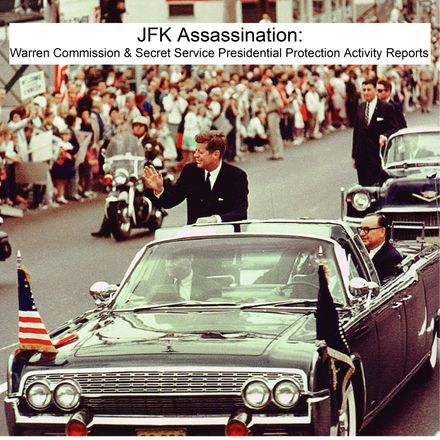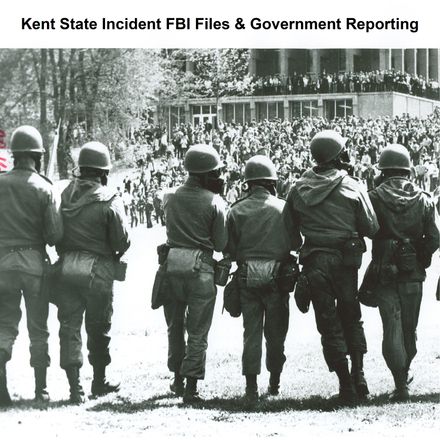Starting from:
$12.95
Home
World War II
World War II Franz Halder Chief of Staff German Diaries and Reports of Interrogations of Halder
World War II Franz Halder Chief of Staff German Diaries and Reports of Interrogations of Halder
World War II Franz Halder Chief of Staff German Diaries and Reports of Interrogations of Halder
1,592 pages of Halder dairies and reports on Halder and results of interrogation of Halder.
Generaloberst Franz Halder, was the Chief of the General Staff of the Supreme Command of the German Army (OKH), 14 August 1939 to 24 September 1942
At the end of 1939, Halder oversaw the development of the invasion plans of France, the Low Countries, and the Balkans. He directed the planning and implementation of Operation Barbarossa, the 1941 invasion of the Soviet Union. Halder became instrumental in the radicalization of warfare on the Eastern Front.
He had his staff draft both the Commissar Order (issued on 6 June 1941) and the Barbarossa Decree (signed on 13 May 1941) that allowed German soldiers to execute Soviet citizens for any reason without fear of later prosecution, leading to numerous war crimes and atrocities during the campaign.
His dismissal by Hitler is regarded as one of the symptoms of the decline and fall of German military might.
On 23 July 1944, after the failed 20 July assassination attempt on Hitler's life by German Army officers, the Gestapo arrested Halder. Although he was not involved in 20 July plot, intense interrogations of the conspirators revealed that Halder had been involved in earlier conspiracies against Hitler. Halder was imprisoned at both the Flossenbürg and Dachau concentration camps. On 31 January 1945, Halder was officially dismissed from the army.
After the war, Halder served as a lead consultant for the US Army Historical Division. He oversaw the writing of over 2,500 historical documents by over 700 former Nazi officers, whom he instructed to remove material detrimental to the image of the German armed forces. Halder used his influence to foster a false history of the German-Soviet war in which the German army fought a "noble war" and which denied its war crimes.
In July 1946, General Franz Halder testified before Commissioner Ian D.
McIlwraith at the IMT Nuremberg commission hearings investigating indicted Nazi organizations.
Franz Halder was awarded the US Meritorious Civilian Service Award in 1961 for his contributions and cooperation with the US effort at Nuremburg.
This collection includes:
Franz Halder Personal Diary-Journal
1,294 pages, translated in 1948 by the Office of Chief Counsel for War Crimes, Office of Military Government for Germany (U.S.). The journal covers The Polish Campaign 14 August - 6 December 1939, The First Winter 7 December 1939 - 9 May 1940, The Campaign in France 10 May 1940 - 30 October 1940, The Second Winter 31 October 1940 - 20 February 1941, The Campaign in France 10 May 1940 - 30 October 1940, The Second Winter 31 October 1940 - 20 February 1941 and The Campaign in the Balkans and Russia, 21 February 1941 - 1 -24 Sept. 1942.
Franz Halder’s diary would serve as a paramount piece of evidence in the Allies’ prosecution of Hitler’s high command at the High Command Trial (or, officially, The United States of America vs. Wilhelm von Leeb). The High Command Trial was the last of the twelve trials for war crimes the U.S. authorities held in their occupation zone in Nuremberg after the end of World War II.
The diary’s detailed account of Hitler’s acts of aggression, the Nazi’s plans to exterminate the Jewish population in Europe, and Halder’s multiple attempts to stage Hitler’s overthrow provided the Allied prosecution with pivotal evidence needed to convict Hitler’s deputies for their crimes against humanity. For example, diary entries from June 1941 reveal Hitler’s order to round up and detain any Jews that had been living in the areas of the Soviet Union that the Nazi’s had successfully invaded. Also, both on September 27, 1938 and November 5, 1939, Halder recorded his efforts to organize a revolt and arrest of Hitler, but both ultimately failed.
The journal was kept by Haider personally in his own shorthand notes jotted down in connection with conferences, memoranda, staff talks, lectures, reports, etc., as they occurred during the discharge of his functions as Chief of 'Staff. They are not to be confused with the official War Diaries kept by the Supreme Command of the German Army, but are rather to be considered the personal notes, views, and impressions of Haider contemporaneously recorded.
Between 1939 and 1941 the entries take the form of notes on conferences, staff talks, and lectures, but after 1941 they become more personal in nature, creating a more well-rounded diary. Both the French and Russian campaigns are discussed as they evolved. The diary is a typescript of an English translation. Includes footnotes and maps.
Office of the U.S. Chief of Counsel for the Prosecution of Axis Criminality Interrogations of Halder
191 pages of English-language pretrial interrogation transcripts of Franz Halder. The Chief of Counsel for the Prosecution of Axis Criminality (OCCPAC) Interrogation Division conducted its interrogations for the benefit of the U.S. prosecution staff at Nuremberg, particularly the International Military Tribunal staff. The persons questioned included not only defendants before the Tribunal but also friendly witnesses.
International Military Tribunal - Office of U.S. Chief of Counsel Files
Includes reports of two interrogations in which Halder provided information regarding German military campaigns, the maltreatment of Russian prisoners of war, and plans to wage war in Western Europe. Halder also identified and commented on a series of captured German documents.
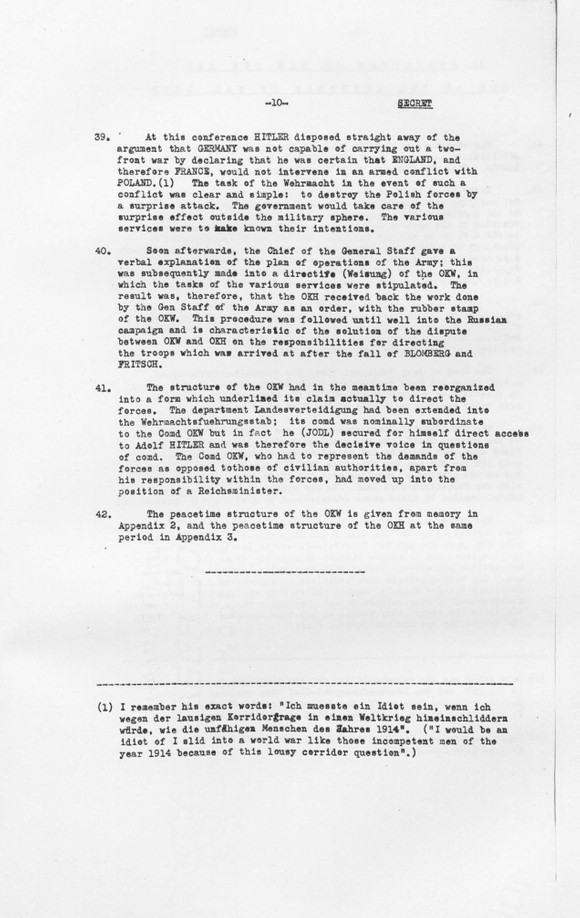
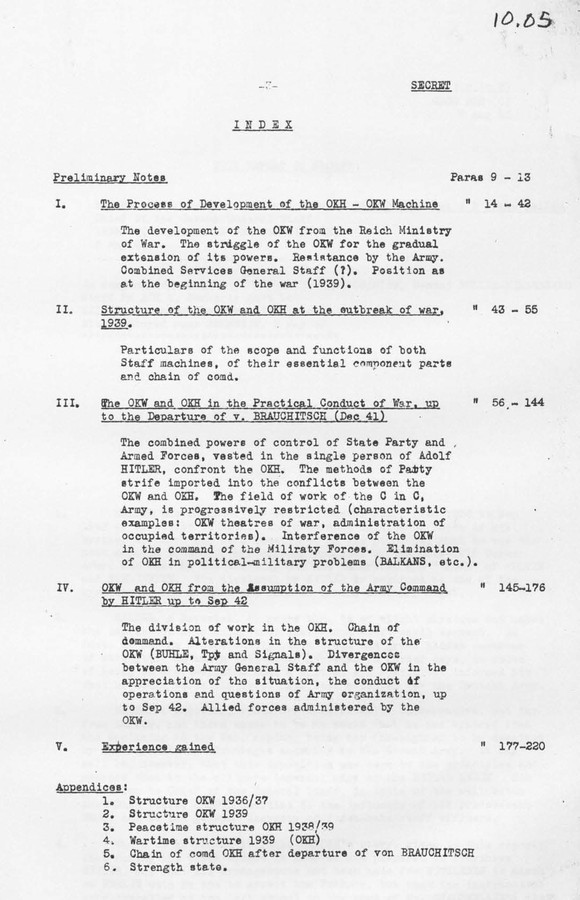
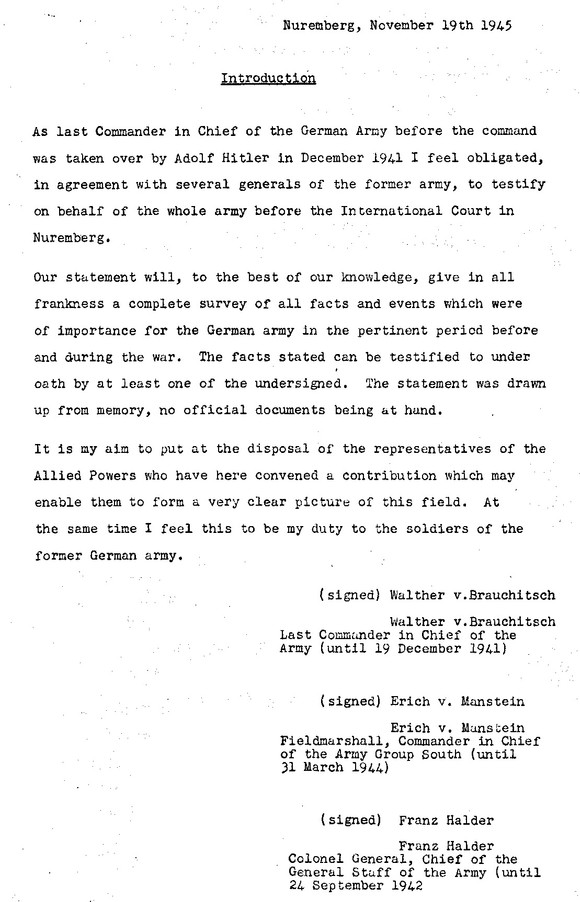

1,592 pages of Halder dairies and reports on Halder and results of interrogation of Halder.
Generaloberst Franz Halder, was the Chief of the General Staff of the Supreme Command of the German Army (OKH), 14 August 1939 to 24 September 1942
At the end of 1939, Halder oversaw the development of the invasion plans of France, the Low Countries, and the Balkans. He directed the planning and implementation of Operation Barbarossa, the 1941 invasion of the Soviet Union. Halder became instrumental in the radicalization of warfare on the Eastern Front.
He had his staff draft both the Commissar Order (issued on 6 June 1941) and the Barbarossa Decree (signed on 13 May 1941) that allowed German soldiers to execute Soviet citizens for any reason without fear of later prosecution, leading to numerous war crimes and atrocities during the campaign.
His dismissal by Hitler is regarded as one of the symptoms of the decline and fall of German military might.
On 23 July 1944, after the failed 20 July assassination attempt on Hitler's life by German Army officers, the Gestapo arrested Halder. Although he was not involved in 20 July plot, intense interrogations of the conspirators revealed that Halder had been involved in earlier conspiracies against Hitler. Halder was imprisoned at both the Flossenbürg and Dachau concentration camps. On 31 January 1945, Halder was officially dismissed from the army.
After the war, Halder served as a lead consultant for the US Army Historical Division. He oversaw the writing of over 2,500 historical documents by over 700 former Nazi officers, whom he instructed to remove material detrimental to the image of the German armed forces. Halder used his influence to foster a false history of the German-Soviet war in which the German army fought a "noble war" and which denied its war crimes.
In July 1946, General Franz Halder testified before Commissioner Ian D.
McIlwraith at the IMT Nuremberg commission hearings investigating indicted Nazi organizations.
Franz Halder was awarded the US Meritorious Civilian Service Award in 1961 for his contributions and cooperation with the US effort at Nuremburg.
This collection includes:
Franz Halder Personal Diary-Journal
1,294 pages, translated in 1948 by the Office of Chief Counsel for War Crimes, Office of Military Government for Germany (U.S.). The journal covers The Polish Campaign 14 August - 6 December 1939, The First Winter 7 December 1939 - 9 May 1940, The Campaign in France 10 May 1940 - 30 October 1940, The Second Winter 31 October 1940 - 20 February 1941, The Campaign in France 10 May 1940 - 30 October 1940, The Second Winter 31 October 1940 - 20 February 1941 and The Campaign in the Balkans and Russia, 21 February 1941 - 1 -24 Sept. 1942.
Franz Halder’s diary would serve as a paramount piece of evidence in the Allies’ prosecution of Hitler’s high command at the High Command Trial (or, officially, The United States of America vs. Wilhelm von Leeb). The High Command Trial was the last of the twelve trials for war crimes the U.S. authorities held in their occupation zone in Nuremberg after the end of World War II.
The diary’s detailed account of Hitler’s acts of aggression, the Nazi’s plans to exterminate the Jewish population in Europe, and Halder’s multiple attempts to stage Hitler’s overthrow provided the Allied prosecution with pivotal evidence needed to convict Hitler’s deputies for their crimes against humanity. For example, diary entries from June 1941 reveal Hitler’s order to round up and detain any Jews that had been living in the areas of the Soviet Union that the Nazi’s had successfully invaded. Also, both on September 27, 1938 and November 5, 1939, Halder recorded his efforts to organize a revolt and arrest of Hitler, but both ultimately failed.
The journal was kept by Haider personally in his own shorthand notes jotted down in connection with conferences, memoranda, staff talks, lectures, reports, etc., as they occurred during the discharge of his functions as Chief of 'Staff. They are not to be confused with the official War Diaries kept by the Supreme Command of the German Army, but are rather to be considered the personal notes, views, and impressions of Haider contemporaneously recorded.
Between 1939 and 1941 the entries take the form of notes on conferences, staff talks, and lectures, but after 1941 they become more personal in nature, creating a more well-rounded diary. Both the French and Russian campaigns are discussed as they evolved. The diary is a typescript of an English translation. Includes footnotes and maps.
Office of the U.S. Chief of Counsel for the Prosecution of Axis Criminality Interrogations of Halder
191 pages of English-language pretrial interrogation transcripts of Franz Halder. The Chief of Counsel for the Prosecution of Axis Criminality (OCCPAC) Interrogation Division conducted its interrogations for the benefit of the U.S. prosecution staff at Nuremberg, particularly the International Military Tribunal staff. The persons questioned included not only defendants before the Tribunal but also friendly witnesses.
International Military Tribunal - Office of U.S. Chief of Counsel Files
Includes reports of two interrogations in which Halder provided information regarding German military campaigns, the maltreatment of Russian prisoners of war, and plans to wage war in Western Europe. Halder also identified and commented on a series of captured German documents.




1 file (150.8MB)

